| Seite 1 |
Kapitel 5
Verkehrsmittel, Reisen, Urlaub, Ferien, Ausflüge

Wiederholung: ModalverbenIn German, modal verbs refer to six auxiliary verbs:
Review the video and complete the quiz in BOLT. |
TippUmlauts on PC-Keyboard (United States) and MacFor PCs You can use the numerical escape codes. These work in most text fields, such as on BOLT. You need a full keyboard with the number pad on the right.

|
Short cut in MS-Word: These short cuts do not seem to work in text fields other than MS-Word.
Hold down Ctrl and Shift, then tap : (colon), release Ctrl and Shift, tap the letter "o" or "u" to get "ö" or "ü" Hold down Ctrl and Shift, then tap : (colon), release Ctrl and Shift, hold down Shift and tap the letter "O" or "U" to get "Ö" or "Ü" For ß:
Macs are real easy and the umlauts will print on any text program: Hold down the "alt" (alt - option) key and type "u". Let go and type letter.
|
Modal Verbs
| have to | able to | allowed to | ought to | want to | like (to) | would like | |
| muss | kann | darf | soll | will | mag | möchte | |
| musst | kannst | darfst | sollst | willst | magst | möchtest | |
| muss | kann | darf | soll | will | mag | möchte | |
| müssen | können | dürfen | sollen | wollen | mögen | möchten | |
| müsst | könnt | dürft | sollt | wollt | mögt | möchtet | |
| müssen | können | dürfen | sollen | wollen | mögen | möchten |
|
Möglichkeiten ankreuzen (check off possibilities):
|
|
Was ich am Wochenende machen (will, muss, möchte, soll):
Freitag: _______________________________ um ______ Uhr Samstag: _______________________________ um ______ Uhr Sonntag: _______________________________ um ______ Uhr |
|
Laden Sie Ihren Partner / Ihre Partnerin ein! (Use the information you filled in above. Pick a logical modal verb.)
|
|
| Leider muss der Partner / die Partnerin absagen. (Your partner has to decline the invitation.) Er/Sie kann nicht. |
(Partner/in sagt:)
Ich kann leider nicht Billiarde spielen. Ich muss / will / soll ...
|
|
|
Übung 5-1c Rollenspiel: Hausarbeiten zuteilen Arbeiten Sie in Gruppen zu viert.
Sie wohnen mit zwei oder drei anderen Studenten in einer Wohngemeinschaft (WG).
Sie verhandeln (negotiate) darüber, wer welche Hausarbeit macht. Tragen Sie die Namen ein.
This is a role-playing exercise, which means you practice and act out parts, then perform the parts.
| Hausarbeit | Montag | Dienstag | Mittwoch | Donnerstag | Freitag | |
|---|---|---|---|---|---|---|
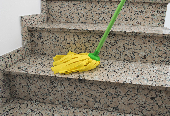 |
das Treppenhaus und den Flur kehren / zweimal in der Woche | |||||
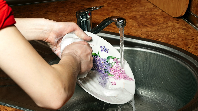 |
Geschirr spülen / jeden Tag | |||||
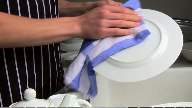 |
Geschirr abtrocknen / jeden Tag | |||||
  | Im Wohnzimmer Staub saugen und Staub wischen / dreimal in der Woche | |||||
 | das Bad putzen / dreimal in der Woche | |||||
 | die Küche sauber machen / einmal in der Woche | |||||
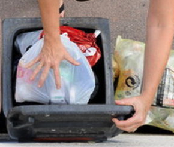 | den Müll austragen / einmal in der Woche | |||||
| Wortschatz
|
Wortschatz
|
|||||
Redemittel:
|
||||||
Tipp: Eine sehr coole Webseite!lingro.com is a powerful on-line program that makes words on Internet sites "clickable". Clicking on the words opens a pop-up frame that gives translations. It is not complete and not perfect, but for German it allows beginners in the language to work productively with a wide variety of on-line texts.It is required to use lingro for reading assignments in this textbook!
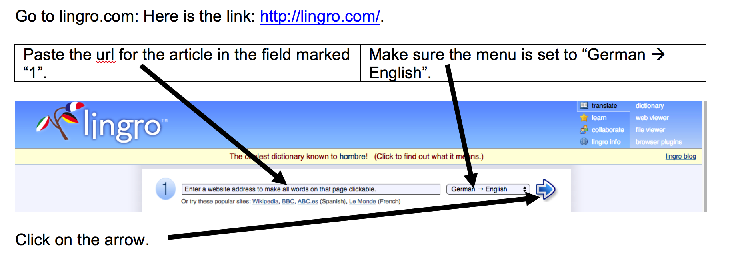 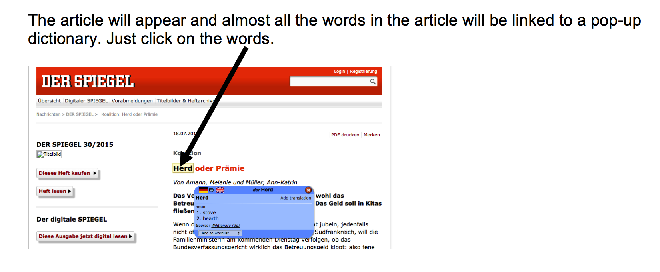 |
Übung 5-1d. Die Wohngemeinschaft. Lesen Sie den Text unten und den Text im Video. Beantworten Sie dann die Fragen im BOLT.
Kulturnotiz: die WG (die Wohngemeinschaft)Wohngemeinschaft (kurz WG) ist eine Wohnung oft für Studierende. Zwei oder mehr unabhängige Mieter teilen eine Wohnung. Jeder Student hat sein eigenes Zimmer. Allgemeine Räume sind das Badezimmer, die Küche und das Wohnzimmer. Es gibt auch Studentenwohnheime mit WGs, so dass es manchmal keinen Unterschied gibt. In WGs kann man neue Freunde kennenlernen, vor allem wenn man im Ausland lebt. Die Mieter in einer WG sollen die Verantwortung für die Sauberkeit der Gemeinschaftsräume selbst tragen.Gehen Sie zu diesem Link und dann beantworten Sie die Fragen im BOLT:
|
Übung 5-1e. Warmup Review. Wohnort, Herkunft, Arbeitsplatz, Reiseziel. Worksheet "Über Wohnort / Herkunft / Arbeitsplatz und Reiseziel sprechen". Teil A (Part A) ist hier. Sie finden Teil B auf Seite 11. Ask how words are spelled IN GERMAN!: Wie schreibt man das?
Redemittel
- Wo wohnt Frau Schulz? -- Sie wohnt in... Wo wohnst du? Ich wohne in...
- Woher kommen Carmen und Pedro? -- Sie kommen aus... Woher kommst du? Ich komme aus...
- Wo arbeitet Iris? -- Sie arbeitet bei... Wo arbeitest du? Ich arbeite bei...
- Wohin fliegt Herr Kruse? -- Er fliegt nach... Wohin fliegst du morgen? Ich fliege nach...
Leute Wo? Woher? Wo? Wohin? ...wohnt in... ...kommt aus... ...arbeitet bei... ...fliegt nach... 
Frau SchultzB.A.S.F England 

Carmen und PedroHamburg Siemens 
Herr KruseMünchen Österreich 
IrisLübeck Bayern Sie Berlin Saarland BMW Spanien Ihre Partnerin
Ihr Partner
Übung 5-1f. Warmup. Umfrage mit Modalverben. Umfrage.
- Musst du heute Abend Hausaufgaben machen?
- Ja
- Nein
- Kannst du gut singen?
- Ja
- Nein
- Sollst du heute in der Bibliothek lernen?
- Ja
- Nein
- Wirst du heute in der Mensa essen?
- Ja
- Nein
- Willst du heute im Internet surfen?
- Ja
- Nein
- Musst du heute Abend Hausaufgaben machen?
- Ja
- Nein
- Kannst du gut singen?
- Ja
- Nein
- Sollst du heute in der Bibliothek lernen?
- Ja
- Nein
- Wirst du heute in der Mensa essen?
- Ja
- Nein
- Willst du heute im Internet surfen?
- Ja
- Nein
- Musst du heute Abend Hausaufgaben machen?
- Ja
- Nein
- Kannst du gut singen?
- Ja
- Nein
- Sollst du heute in der Bibliothek lernen?
- Ja
- Nein
- Wirst du heute in der Mensa essen?
- Ja
- Nein
- Willst du heute im Internet surfen?
- Ja
- Nein
- Meine Partnerin heißt / Mein Partner heißt _________________________________________
- Meine Partnerin heißt / Mein Partner heißt _________________________________________
- Meine Partnerin heißt / Mein Partner heißt _________________________________________
Erzählen Sie! Becky kann heute Abend fernsehen. Bill wird seine Mutter nicht anrufen. usw.
Kleine Berichte
Kleine Berichte (mini-reports) will be given by students chosen at random to be presented at the beginning of every classroom session. These oral reports...- are presented without any notes,
- summarize or reflect skills practiced in the previous class session,
- should be six to ten sentences,
- are graded (with generous allowance for minor errors),
- can be on one of two or more topics.
For example: Pick one topic.
- Describe the housework that you and your roommates do on certain days of the week.
- Describe your plans for the weekend and say what others are doing (use modal verbs).
The kleine Berichte may also be in the form of a conversation that you perform with another student in class. For example: You want to have your partner do certain chores on certain days of the week. Your partner comes up with excuses why they cannot do these chores.
Classroom Commands
Tell one person Tell two or more people Arbeite mit einer Partnerin (female) / ...mit einem Partner (male)! Work with a partner! Arbeitet mit einer Partnerin (female) / ...mit einem Partner (male)! Stell Fragen! Ask questions! Stellt Fragen! Beantworte die Fragen! Answer the questions! Beantwortet die Fragen! Hör zu! Listen! Hört zu! Geh an die Tafel! Go to the board! Geht an die Tafel! Schreib die Antwort! Write the answer! Schreibt die Antwort! Lies den Satz! Read the sentence! Lest den Satz! Nimm einen Stift! ...ein Stück Papier! Take a pencil / pen! ...a piece of paper! Nehmt einen Stift! ...ein Stück Papier! Berichte! Report! Berichtet! Steh auf! Stand up! Steht auf! Setz dich! Sit down! Setzt euch! Mach das Buch auf Seite .... auf! Open the book to page...! Macht das Buch auf Seite .... auf! Mach das Buch / die Bücher zu! Close the book! / Close your books! Macht das Buch / die Bücher zu! Pass auf! Pay attention! Passt auf! Sprich lauter! Speak louder! Sprecht lauter! Tipp
Text-to-Speach!- Click on this link to Natural Readers.
- From the drop-down menu select one of the German voices.
- Type or paste in a German text.
- Click on the arrow "play-pause" button.
- The speed can be controlled with the drop-down speed control menu.
The quality of the pronunciation is good enough for practice, if a bit mechanical.
- Musst du heute Abend Hausaufgaben machen?